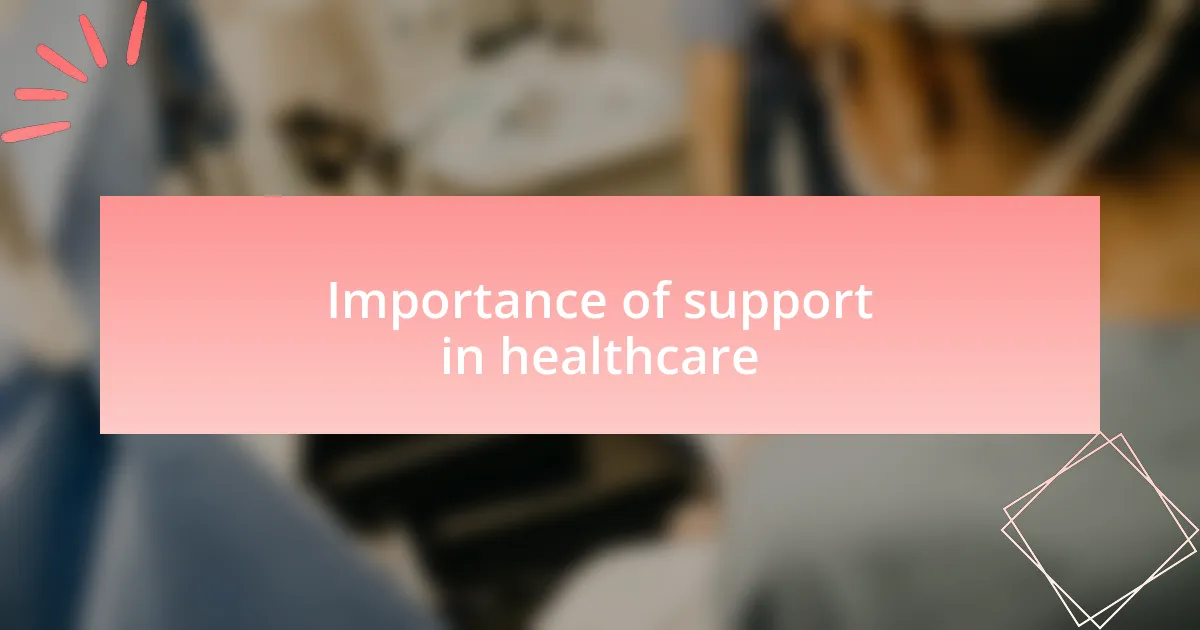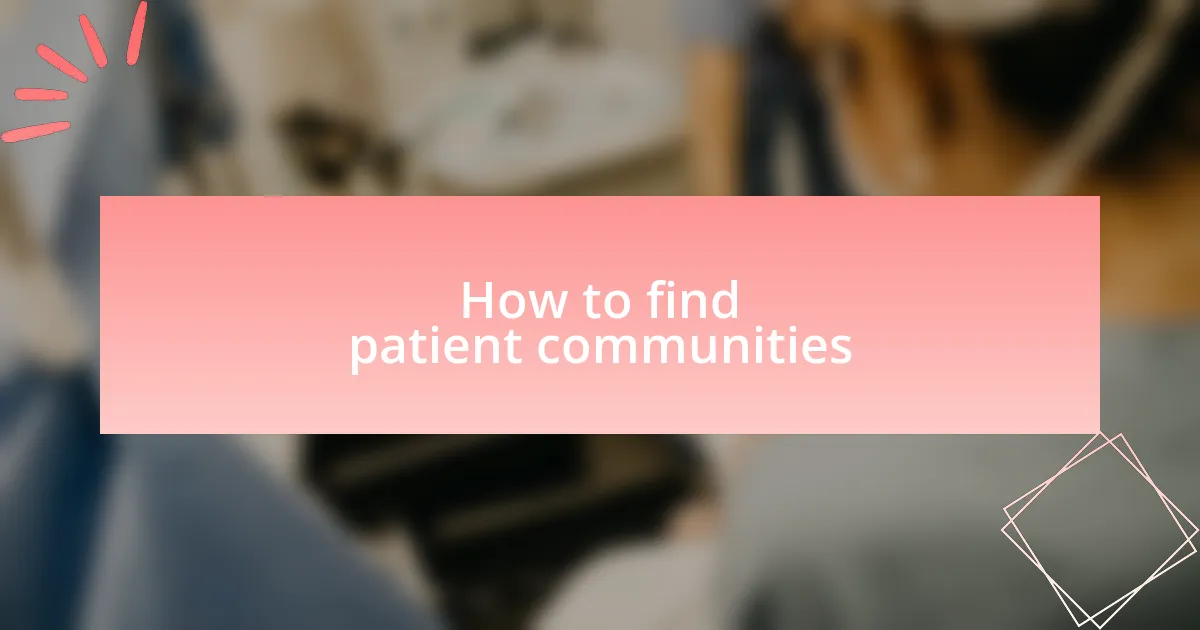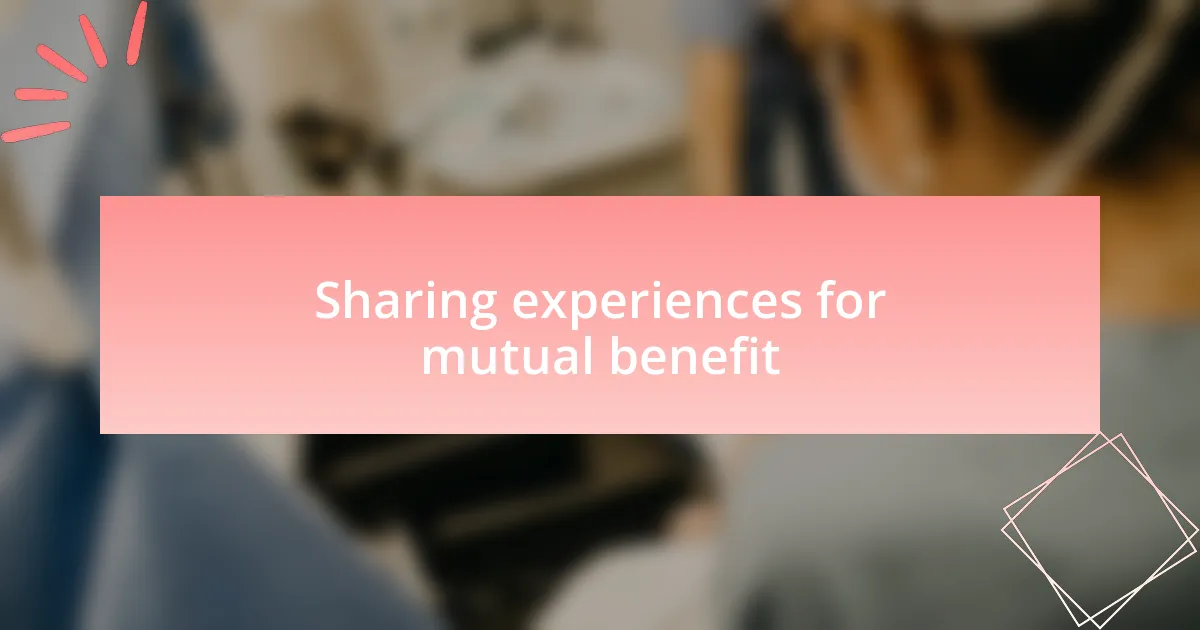Key takeaways:
- Patient communities offer essential emotional support, transforming individuals from passive recipients to active participants in their healthcare journeys.
- Sharing experiences within these communities fosters connection, empowerment, and collective learning, leading to emotional healing and growth.
- Finding patient communities can be achieved through online platforms, local support groups, and recommendations from healthcare providers.
- Support not only alleviates emotional burdens but also enhances knowledge about treatment options and coping strategies through shared insights.

Understanding patient communities
Patient communities serve as a vital lifeline for those navigating the often-daunting landscape of healthcare. I still remember the first time I stumbled across an online forum dedicated to my condition. It felt like entering a warm embrace, where the shared stories and experiences were both comforting and enlightening.
What strikes me most about these communities is the genuine support they offer. I’ve seen members share not just medical advice, but also their fears and triumphs, creating a sense of camaraderie that can be hard to find elsewhere. It raises an important question: how often do we feel truly understood in our healthcare journeys?
Moreover, patient communities provide a space for empowerment, turning individuals from passive recipients of care into active participants. In sharing my journey, I noticed others felt inspired to voice their own experiences. Isn’t it amazing how connection can lead to collective strength? These communities become a collaborative force, illuminating the path toward healing together.

Importance of support in healthcare
Support in healthcare is not just a bonus; it’s essential for emotional and mental well-being. I recall a time when I faced a tough medical decision, and my anxious mind felt paralyzed. It was during that period that I reached out to my patient community, where fellow members patiently listened and shared their own experiences. Their empathy and understanding not only reassured me but helped me regain my confidence to make informed choices.
The power of shared experiences cannot be overstated. I’ve noticed that when we articulate our health struggles to others who truly get it, it brings an incredible sense of relief. Have you ever felt the weight of uncertainty lift just by discussing your fears with someone who understands? It’s this kind of vulnerable sharing that reinforces our resilience, nurtures our hope, and often leads to breakthroughs in personal healthcare journeys.
Furthermore, support in healthcare extends beyond emotional backing; it fosters a culture of knowledge. Those interactions often stimulate insightful discussions about treatment options or lifestyle changes I hadn’t considered before. When was the last time a simple conversation led you to a better understanding of your situation? In these patient communities, I realized that each shared story can be a stepping stone on someone else’s path, making the collective knowledge invaluable.

How to find patient communities
Finding patient communities can be a rewarding journey, and I’ve come to appreciate the power of online platforms. Social media groups and health-focused forums can serve as excellent starting points. I remember the first time I joined an online forum; it felt like stepping into a room full of people who just got it. Searching for specific hashtags or keywords related to my health condition often led me to vibrant communities where individuals shared advice, comfort, and, most importantly, companionship.
Another effective way to find patient communities is by exploring local support groups or health-related events. When I attended my first health expo, I was amazed at the diversity of organizations offering resources and the connections I forged right then and there. Have you ever met someone whose story resonates with you so deeply that it lifts your spirits? Those immediate bonds can create lasting friendships and support systems.
Don’t overlook the power of healthcare providers either. They often have invaluable resources or can recommend local or virtual communities. I once spoke with my doctor about struggling to connect with others, and she pointed me toward a local meetup. This led to a transformative experience, where I discussed my fears and hopes with people who truly understood my journey. It’s incredible how just reaching out can lead to finding a supportive network.

Sharing experiences for mutual benefit
Sharing experiences within patient communities not only empowers individuals but fosters a sense of belonging. I remember the first time I shared my own story about living with a chronic condition; the overwhelming support I received was unlike anything I had imagined. It sparked a realization: when we open up about our struggles, we often find that others have faced similar challenges and can offer insights and encouragement we never knew we needed.
Connecting with others who have been through similar experiences creates a feedback loop of support. There was a particularly poignant moment when I read a post from someone who articulated feelings I had bottled up for years. It felt like a weight lifted, knowing that I wasn’t alone in wrestling with those emotions. Have you ever felt that profound connection with someone, even if you’ve never met them? Those shared experiences can be a powerful catalyst for emotional healing and growth.
In these communities, sharing isn’t just about venting; it’s about collective learning and progress. I once participated in a discussion where someone suggested practical coping strategies that had worked for them. Implementing those suggestions not only made a difference in my daily life but also strengthened our community bond. Isn’t it inspiring how sharing our journeys can illuminate paths for others, creating a tapestry of mutual benefit?